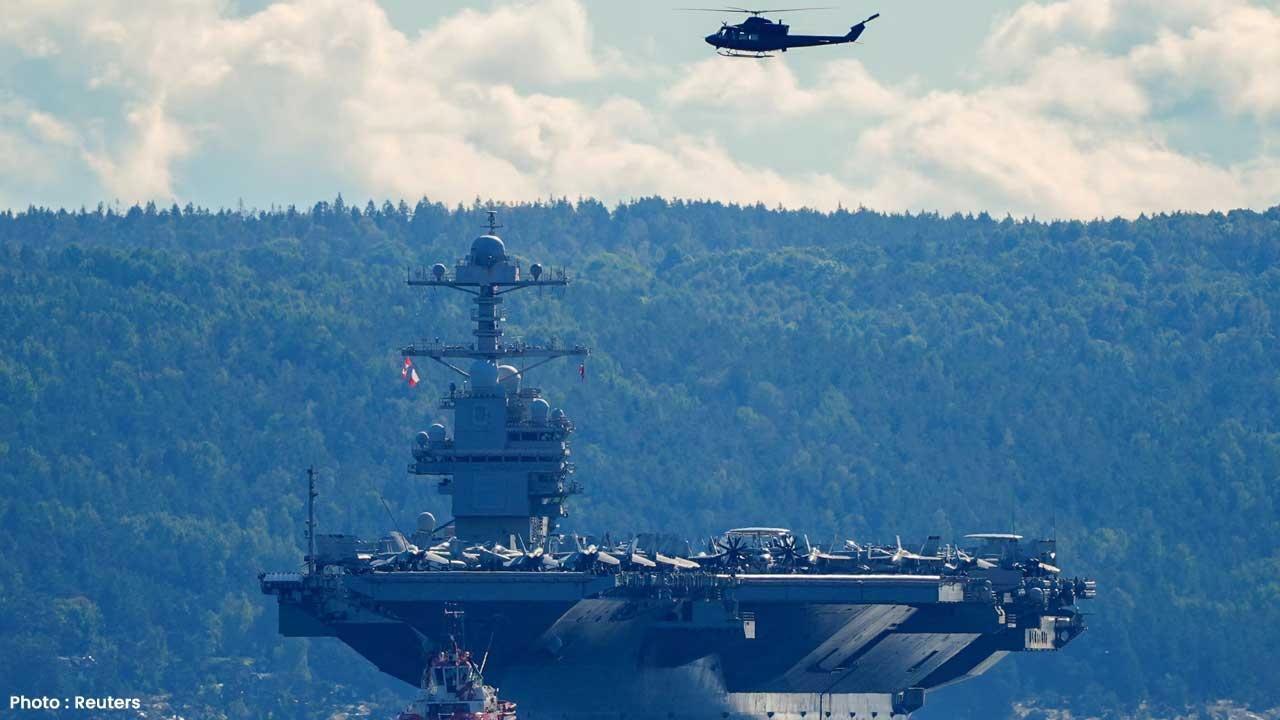You have not yet added any article to your bookmarks!

Join 10k+ people to get notified about new posts, news and tips.
Do not worry we don't spam!

Post by : Rameen Ariff
The US Navy has sent its latest aircraft carrier, the USS Gerald R. Ford, into the Caribbean Sea, marking a significant American naval buildup not seen for decades. This decision, publicized by the Navy on Sunday, has sparked a global conversation regarding America's intentions as it presses on with airstrikes against vessels alleged to be engaged in drug trafficking.
The Ford’s deployment signifies a critical change in Operation Southern Spear, a mission that the Trump administration claims focuses on curbing narcotics. However, the scale of this operation, involving nearly a dozen warships and around 12,000 sailors and Marines, has raised concerns that it doubles as a strategy to apply pressure on Venezuelan President Nicolás Maduro.
As the aircraft carrier navigated the Anegada Passage near the British Virgin Islands, US officials framed this move as essential for safeguarding the Western Hemisphere. Rear Adm. Paul Lanzilotta, leading the strike group, asserted that this increased presence enhances America’s capacity to protect its “security and prosperity” from narco-terrorism. Meanwhile, Adm. Alvin Holsey, overseeing Latin America and Caribbean operations, labeled this development as vital for addressing the escalating transnational threats in the area, stating that the United States is “prepared” to uphold stability.
The Ford’s arrival coincides with an uptick in US military operations at sea. Recently, the US forces reportedly destroyed a small craft in the eastern Pacific, claiming it was involved in smuggling drugs, leading to three fatalities, and raising the overall death toll since early September to 83 across 21 strikes. While the US Southern Command shared footage of the incident, critics including human rights advocates and local leaders have called for more transparency regarding the actions taken against alleged “narcoterrorists.”
Responses within the Caribbean and Latin America reveal stark divisions. In Trinidad and Tobago, mere miles from Venezuela, authorities confirmed joint military drills with American forces aimed at fighting violent crime and drug trafficking. These exercises, the second within a month, involve Marines from the 22nd Expeditionary Unit positioned near Venezuela’s coastline for some time.
Conversely, in Caracas, the sentiment is quite different. Venezuela’s government has consistently criticized the presence of US military forces along its borders, characterizing the training as attempts to undermine its sovereignty. Although Venezuelan officials have yet to address the Ford’s arrival, President Maduro took to Facebook stating their readiness to “defend our homeland against any form of criminal aggression.” Additionally, Venezuelan authorities recently highlighted a “massive” mobilization of both military and civilian forces to prepare for a potential US incursion.
Pressure mounts on Maduro as Secretary of State Marco Rubio declared that the State Department will designate the Cartel de los Soles as a foreign terrorist organization starting November 24. This move, claiming the cartel is led by Maduro and other high-ranking officials, means that aiding it in any form will become a federal offense, isolating the Venezuelan administration further.
Critics of the aircraft carrier's deployment—originally designed for extensive warfare rather than counter-drug efforts—suggest the underlying motives may extend beyond narcotics control. While some analysts believe that the Ford's purpose is to intimidate Maduro rather than execute direct attacks, others caution that it raises fears of possible air strikes within Venezuelan territory. The Trump administration has already indicated ambitions to broaden operations beyond just maritime engagements, asserting that the US will also “stop the drugs coming in by land.”
This situation has left the region on heightened alert. Governments across Latin America, along with global rights organizations, remain closely attuned to the evolving circumstances. Elizabeth Dickinson, a leading analyst at the International Crisis Group, emphasized that this juncture will test the extent of Washington’s willingness to utilize military might in Latin America, noting the “anxieties” evoked by the Ford's deployment, both in Venezuela and its neighboring countries.
With the USS Gerald R. Ford now actively deployed and the US ramping up naval operations, the Caribbean has become a critical arena for geopolitical tension. All eyes are on the unfolding scenario, raising the pivotal question: how far will the United States go—and how will Venezuela react as these tensions escalate?










Minimarkets May Supply Red and White Village Cooperatives
Indonesia’s trade minister says partnerships with minimarkets and distributors can strengthen villag

South Africa vs West Indies Clash Heats Up T20 World Cup 2026
Unbeaten South Africa and West Indies meet in a high-stakes Super 8 match at Ahmedabad, with semi-fi

Thai AirAsia Targets Growth Through China & Long-Haul Routes
Thai AirAsia aims 6-9% revenue growth in 2026 expanding domestic flights and new international route

India Ends Silent Observer Role Emerges Key Player in West Asia
From passive energy buyer to strategic partner India’s diplomacy in West Asia now commands trust inf

Indian Students Stuck In Iran Amid US-Iran Tensions And Exam Worries
Rising US-Iran tensions leave Indian students stranded, fearing missed exams could delay graduation

India Says J&K Budget Exceeds Pakistan’s IMF Bailout
India slammed Pakistan at UNHRC, stating J&K’s development budget exceeds Pakistan’s IMF bailout and